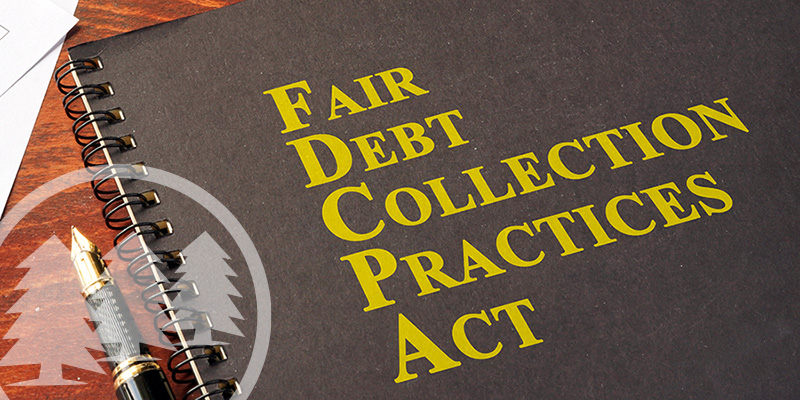HOA dues collection can be a chore, which is why many HOAs turn to third parties for assistance. When it comes to collecting dues, though, it is important to stay compliant with the federal Fair Debt Collection Practices Act.
What Is the Fair Debt Collection Practices Act?
The Fair Debt Collection Practices Act, otherwise known as FDCPA, is a federal act passed by Congress in 1977. The FDCPA was designed to protect consumers from misleading, abusive, and unjust collection practices performed by collectors. This includes the assessments and dues, recognized as “debt,” charged by HOAs, the “creditor,” to homeowners, the “consumer,” and collected by third parties, the “debt collector.”
According to the FDCPA, a debt collector is any person with the principal purpose of debt collection who either directly or indirectly collects (or tries to collect) debts owed to another party. In many cases, the debt collector is an HOA attorney or collection agency. It is important to note that filing a lien also counts as an attempt to collect debts, so they are also regulated by the FDCPA.
As for HOA or property management companies, the court generally does not consider them as debt collectors since their primary purpose is not to collect debts. Though, if a company dedicates most of its time to debt collection, then the court will consider it as a debt collector under the FDCPA.
Required Notices from Debt Collectors
To remain FDCPA compliant, debt collectors must give consumers an oral or written notice. This notice must state that a debt collector is attempting to collect a debt. Following this initial point of communication, the debt collector must then send a written notice within five (5) days. In addition to the debt amount and the name of the creditor to whom the consumer owes the amount, the written notice must include the following statements:
- The debt will be assumed valid unless the consumer disputes the debt’s validity within 30 days
- Proof of delinquency will be provided to the consumer if the consumer disputes the debt’s validity within the 30-day period
- If the current creditor differs from the original creditor, the debt collector shall give the consumer the original creditor’s name and address, provided the consumer submits a written request within the same 30-day period
Furthermore, any and all collection notices must follow the “least sophisticated consumer” standard. In other words, debt collectors must provide notices that even the most inexperienced consumer can understand. The purpose of this standard is to protect consumers from potential liability arising from misinterpretations.
Communication Standards for Debt Collectors
According to the 15 U.S. Code § 1692b of the federal debt collection act, debt collectors seeking location information about the consumer from other parties must do the following:
- Identify him/herself;
- Explain that he/she is verifying location information about the consumer;
- Identify his/her employer (only if that information is requested);
- Refrain from saying the consumer owes any debt;
- Avoid communicating with any party more than once unless asked to do so by the party or unless the debt collector has reason to believe that the initial reply of the party is false or incomplete and that the party now has the correct or complete location information;
- Refrain from communicating via postcard;
- Avoid the use of any language or symbol on any oral or written communication (including envelopes) that points to the debt collector’s business or purpose (i.e. debt collection); and
- If the debt collector knows that an attorney has been hired to represent the consumer in relation to the debt and knows or can come to know the said attorney’s name and address, the debt collector must not communicate with any other party other than the said attorney except if the attorney does not respond to communication attempts by the debt collector within a reasonable period of time.
Prohibited Behavior Under the Fair Debt Collections Practices Act
Since the function of the FDCPA is to protect consumers and regulate debt collectors, there are some prohibited acts that the latter must refrain from doing.
General Acts

According to the Fair Debt Collection Practices Act, a debt collector cannot:
- Talk about the debt or delinquency with any other party other than the consumer
- Call before to 8:00 A.M. or after 9:00 P.M.
- Communicate with the consumer’s place of work if the consumer told the debt collector not to call
- Get in touch with the consumer if an attorney is known to represent the consumer
- Contact the consumer if the consumer sends written notice to the debt collector to halt communications or sends written notice to the debt collector that the consumer refuses to pay
Abuse or Harassment
The FDCPA protects consumers from practices of abuse or harassment at the hands of debt collectors. Under this act, debt collectors cannot:
- Threaten the consumer with violence or other criminal activity
- Use any language of profane or obscene nature
- Print out a list of debtors or debts
- Call incessantly in an attempt to annoy or harass
- Call the consumer without identifying him/herself
It is worth noting that the most common violation of the FDCPA is debt collectors calling consumers incessantly. In fact, over 40% of consumer complaints involve collectors calling non-stop in a blatant attempt to harass.
False or Misleading Statements
Debt collectors also must not produce any statements that are erroneous or misleading. This includes the following:
- Dishonestly personify him/herself as an attorney
- Express implicitly or explicitly that the consumer will be arrested or criminally prosecuted if he/she fails to settle the debt
- Threaten the consumer with a suit or seizure of property if the debt collector cannot legally do so
- Report or threaten to report the consumer for erroneous credit information
Unfair or Unconscionable Practices
According to the FDCPA, debt collectors cannot do the following:
- Collect or attempt to collect a legally unauthorized amount
- Seek or accept a post-dated check without giving notice of intent to deposit in writing of at least three (3) days
Consumer Defense Against Violating Debt Collectors
Should the debt collector violate any of these standards and provisions, the consumer can file a federal claim. The consumer may seek compensation in damages as well as attorney’s fees and other reasonable costs. Consumers may file this complaint with the following agencies:
- Federal Trade Commission (FTC)
- Consumer Financial Protection Bureau (CFPB)
- State Attorney General’s Office
Protection for All
Homeowners have a responsibility to pay assessments and dues to the association. But, they also have a right to be treated fairly and without harassment. Homeowners associations and debt collectors alike must keep this in mind. In order to stay out of trouble and keep the peace, it is imperative to review the Fair Debt Collection Practices Act and follow its provisions accordingly.
If your association is finding it difficult to deal with dues collection and legal matters, the Cedar Management Group can help. Give us a call at (877) 252-3327 or contact us online to learn more about our services.
RELATED ARTICLES:
- What Every Board Member Should Know About HOA Collections
- HOA Fine Policies: What’s Reasonable And Legal?
- What Happens If You Don’t Pay HOA Fees?







